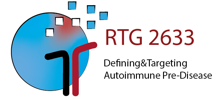MD A24: Unveiling PTX3: A novel biomarker in the pathogenesis and progression of bullous pemphigoid
Bullous pemphigoid (BP) is the most common autoimmune blistering disease, characterized by autoantibodies targeting the dermal-epidermal junction, such as BP180 and BP230, leading to skin inflammation and tissue damage. While markers of autoimmunity and inflammation are elevated in the blister fluid and/or sera of BP patients, the identification of novel biomarkers remains essential for early diagnosis and therapeutic advances. This project investigates pentraxin 3 (PTX3), an inflammatory mediator with a key role in immune regulation, as a potential biomarker in BP. Preliminary studies have identified elevated levels of PTX3 in BP patient sera, prompting further investigation into its local expression, functional impact on keratinocytes, and role in immune complex-induced inflammation. Using in vitro and ex vivo approaches, this study explores the significance of PTX3 in BP pathogenesis, particularly its involvement in neutrophil-driven tissue damage. Ultimately, this project aims to establish PTX3 as an early biomarker (or drug target) for BP, with potential implications for disease monitoring and targeted therapeutic strategies. The findings will contribute to a deeper understanding of autoimmune blistering diseases and foster novel approaches to patient care within the framework of the Research Training Group.

- Projects
- 1st Generation
- 2nd Generation
- A: Defining Autoimmune Pre-Disease
- B: Targeting of Autoimmune Pre-Disease
- Associated projects
- Medical doctoral researcher projects
- Concluded projects
- Medical doctoral researchers
- MD A20: Molecular and cellular characterization of aging effects in liver and plasma in mice
- MD A21: Kinase activity profiling of autoantibody-mediated angiotensin II type 1 receptor signaling in endothelial and immune cells
- MD A22: Systemic lupus erythematosus and fibromyalgia syndrome – movement as a biomarker for pain perception
- MD A24: Unveiling PTX3: A novel biomarker in the pathogenesis and progression of bullous pemphigoid
- MD B8: Deciphering the signaling events in desmoglein 1 and 3 antibody-induced pathology to investigate possible impacts for the onset of new autoimmune reactions
- MD B9: Testing substances influencing the protein biosynthesis in the human skin organ culture model for pemphigus vulgaris
- MD B10: Testing ion channel inhibitors in the human skin organ culture model for pemphigus vulgaris
- MD B11: Nutritional treatment study to improve inflammatory IgG Fc glycosylation
- MD B12: Resting heart rate as a prognostic marker for fatigue in primary Sjoegren's syndrome
- MD B13: Deciphering the signaling events in BP180 antibody-induced pathology to investigate possible impacts for the onset of new autoimmune reactions
- MD B14: Selective depletion of antigen-specific autoantibodies by targeted degradation
- Medical doctoral researchers
Medical doctoral researcher

Participating Researchers


Mentor



